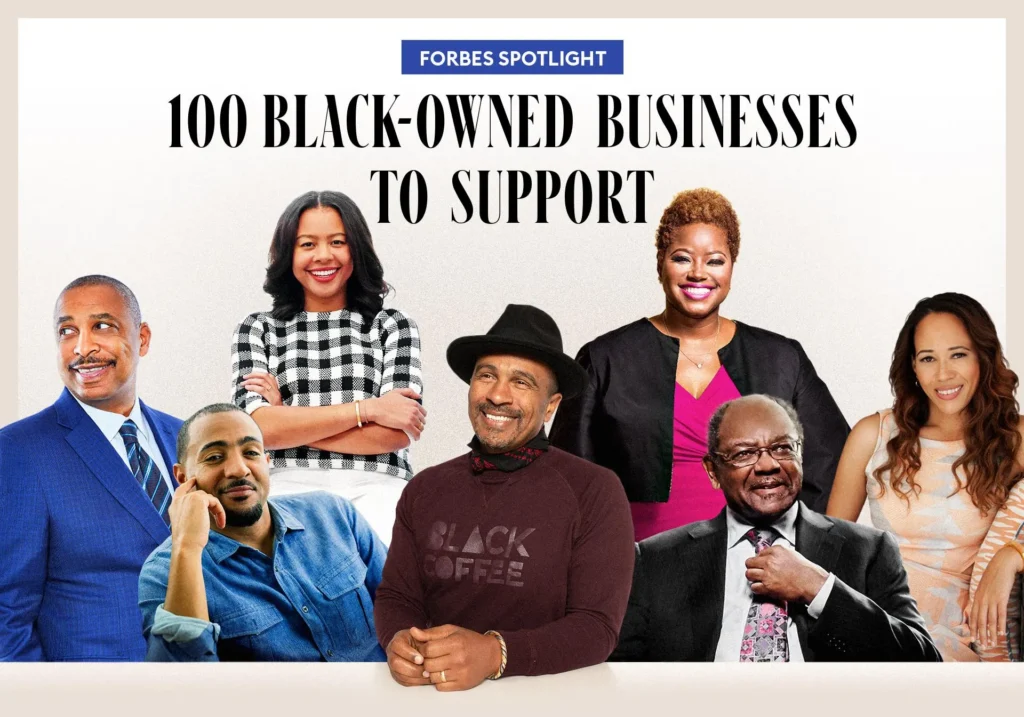The U.S. is home to roughly 2.5 million Black-owned businesses, according to the Census Bureau. Although the vast majority are sole proprietorships or small-scale affairs, an increasing number have regional reach and national ambitions. Below, we resurface 10 Black entrepreneurs who have recently been featured in Forbes and provide a directory of an additional 90 Black-owned businesses to support. It is by no means an exhaustive list: We aren’t including numerous high-profile celebrity entrepreneurs like Oprah Winfrey or Rihanna or the many successful black business owners who sell services to other corporations, like World Wide Technology’s David Steward.
These entrepreneurs and owners sell cosmetics, clothing, books, cars, and financial products that you can buy. Fewer offer healthcare or consumer tech products, in part, because they lack access to venture funding. If you are interested in learning more about other Black-owned businesses, there are a number of apps and directories online, including The Buy From A Black Woman Directory, The Black-Owned Market, Etsy’s Black-Owned Shops, Black Enterprise’s Top 100 list, Bank Black, and Bon Appétit’s list of Black-owned restaurants.
We originally included 75 businesses on this list. We added an additional 25 for Blackout Day on July 7, 2020.
Founded by Maitland in 1995, the $9 billion investment firm is an expert in defensive investment strategies involving convertible bonds, designed to protect against downside while capturing most of the stock market’s gains. The firm’s $500 million publicly-traded closed-end fund, Advent Convertible & Income (Ticker: AVK), is the easiest for public investors to access with no investment minimums, but it carries the most risk due to a leveraged structure. Principally owned by Maitland, whose surgeon father once operated on Dr. Martin Luther King Jr., 55% of Advent’s staff are women and minorities.
One of the top-performing investment firms in the world, Brown Capital’s flagship Small Company Fund has generated an average annual return of 12%-plus since 1992, about double the Russell 2000 Growth Index. While that fund is closed to investors, Brown Capital has successfully expanded into international small-cap stocks and mid-cap stocks, which are funds anyone can buy. A former T. Rowe Price portfolio manager, founder Eddie Brown started the business in 1983. Now fully owned by employees, 70% of the fast-growing firm’s workforce are minorities.
A single mother and breast cancer survivor, Cashmere Nicole founded Beauty Bakerie in 2011 as a new lipstick brand that was vegan, non-toxic, and cruelty-free. Beyoncé featured the nascent brand on her website, and Nicole began marketing her long-lasting lipsticks on Instagram, where it now has 1.2 million followers. Today, Beauty Bakerie has raised $10 million from investors such as Unilever’s venture arm, New Voices Fund, and top black execs like Kenneth Chenault (former CEO of AmEx), making Nicole the rare black woman to raise that level of venture funding.
Three years into a stint on the commodities desk at Goldman Sachs, Twine’s mother died in a car accident. The tragedy pushed her to reconsider her career path. Inspired by her mother, a chemist who had developed a natural face cream, and her grandmother, who taught her how to make products with natural ingredients, she launched the natural haircare brand Briogeo in 2014. Targeting customers by hair texture (wavy, coily, dry, thin), rather than ethnicity, the brand was profitable from the start. By the end of 2018, it grew revenues to $10 million. It launched internationally in 2018 and is now sold on Sephora shelves around the world, as well as through the online U.K. retailer CultBeauty. Twine sold a minority stake in the company to Drunk Elephant investor VMG.
After putting herself through college at California State University Sacramento, Dellinger got an internship at Intel, where she worked while developing her idea for a natural hair care line. She launched Curls in 2002, bootstrapping the business. Her big break came with a partnership with Target. Today, about 80% of the company’s revenue comes from selling products in stores such as Walmart, Bed Bath & Beyond, and CVS, with the rest from online sales. Dellinger has also written a book about her journey “from the projects to the penthouse,” and had her own TV show on Oprah’s OWN Network, helping other women-led businesses reach the million-dollar mark.
Nigerian-born entrepreneur Wemimo and his business partner Goel co-founded Esusu in 2019, a mobile platform that helps marginalized communities save money, access capital, and build credit. Esusu’s platform reports renters’ monthly payments to credit bureaus, helping improve their credit scores. The startup has raised nearly $200,000 for rental assistance to support those affected by Covid-19, and has over 200,000 users. Esusu expects to generate $1.2 million in revenue this year.
Founded in 2013 by Imira, Mayvenn is a venture-backed digital salon where customers buy human hair extensions and wigs, and book appointments with stylists. The business has 63 employees, 81% of whom are people of color, and supports 3,000 Black stylists across the U.S. During the pandemic, Imira raised $1.3 million in relief funds for his network of stylists.
Robin McBride and Andréa McBride-John were half-sisters who didn’t know of each other’s existence until 1999. Six years later, they launched their wine business, McBride Sisters Collection. Last year, the business sold nearly 100,000 cases, putting it in the top 3% of U.S. wineries. Today, 90% of their staff are women, and more than half are people of color.
Back in 2007, Dr. Gentles and Bryant founded NightLight Pediatric, an urgent-care center for kids. Today, it has eight locations, 130 employees (80% of whom are people of color), and generates $11 million in revenue annually.
Konte founded Red Bay Coffee six years ago, expanding it to include five Bay Area cafes and robust corporate sales. Though the pandemic forced his cafes to close and hurt business contracts with companies like Facebook and Twitter, the roastery and wholesale business continue to operate successfully.

